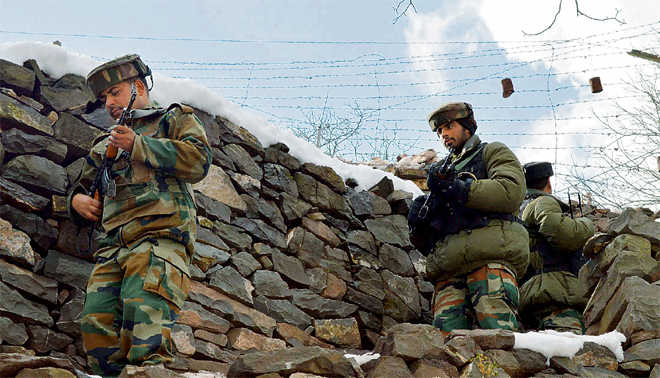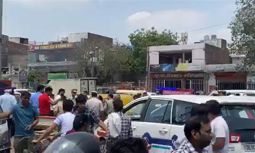
Political mileage: Ruling politicians are chest-thumping the ‘surgical strikes’. PTI
Lt-Gen Raj Sujlana (retd)
The acerbity of the current political polemics over the surgical strikes is nothing new. Politicians have never tried to understand how the military operates and how and when to exploit a war or a war-like situation to their advantage and have thus repeatedly faltered. Be it the ceasefire and going to the UN against military advice during the 1947-48 Indo-Pak war, when success was so very visible; or the return of over 90,000 prisoners to Pakistan after the 1971 Indo-Pak war without getting back our prisoners; or in ensuring that the armed forces are always battle-ready in all aspects, disregard of which led to the disaster of the 1962 war.
Sadly, they still do not realise that if this trend continues, despite the resilience of the soldiers, adversity can strike again. While war is the result of failed diplomacy, war-like internal situations come about when the politicians, bureaucracy and the police are incapable of controlling the situation, and it warrants the armed forces to step in, more often the Army. The responsibility of the conduct of war or operations in a disturbed area must be left to military commanders, who will plan and conduct operations as required by the situation.
Hype over surgical strikes
The hype created over 'surgical strikes', sees no end. While the ruling politicians haven't stopped chest-thumping since these operations were launched on the night of September 28-29, 2017, it is anathema for the opposition politicians, and their goatee has been pulled no end. The lead was taken by Manohar Parrikar, the then Raksha Mantri (RM), who stated that it was for the first time that the Army had crossed the Line of Control (LoC) after "Hanuman was invoked in them." He didn't even know that three Infantry regiments (Bihar, Kumaon and Rajput) had launched numerous such attacks with the war cry of 'Bajrang Bali Ki Jai!' In doing so, he set aside the stellar role the armed forces have played since 1947 in ensuring the integrity of the nation with diligence and blood.
Now, a union minister adds that the ruling party has drawn no political mileage from these operations and such statements by the opposition will raise the morale of the terrorists. On both counts, he is wrong. The open and blatant credit taken during the Uttar Pradesh state elections is no secret and one wonders how this will raise the morale of the terrorists.
Then, a Congress spokesperson has listed numerous such strikes carried out in the past, erroneously calling them 'strategic surgical strikes'. A wrong perception gets conveyed to the public. There is a need to put this matter in the correct perspective.
Raids, strikes & tactical ops
The Army has a list of terminologies to describe various operations, but there is no such term as surgical strikes. Borrowed from the US Air Force, it has become fashionable. Such operations have a very simple term: raid. These could be shallow, ie when the target is located over a short distance in enemy territory (numerous such actions have taken place, including the much talked of surgical strikes). Or, these could be deep ones when the objective lies in greater depth. An example of this is the raid by personnel of 9 Para Commandos during the night of December 13-14, 1971 when they infiltrated across the LoC and the Poonch river and took the enemy gun position by surprise. Heavy casualties were inflicted on the enemy and all six 122-mm Chinese guns deployed destroyed, at the cost of our own: two killed and 14 wounded.
Such successful raids are tactical operations and not strategic in nature. Their effect is generally localised, whereas a strategic operation must influence the course of war.
For example, during World War II, as the Japanese thrust their way through Burma, a major operation was launched to strike the enemy in their rear areas. The Chindits, also known as Long Range Penetration Groups of special operational units of the Indian and British armies, were launched deep behind the Japanese lines. In the first phase (starting February 1943), 3000 soldiers penetrated on foot deep into Burma. Alongside, as a cover, a large-scale varied deception was planned and executed, as they cut their way to much success. In the second phase (from February, 1944 to August, 1944), 9000 men were aerially interjected behind the enemy lines in gliders and some on foot. These operations greatly assisted the ongoing ground thrusts to speed up the Japanese retreat and turned the tide of war in this theatre.
Two actions stand out as surgical strikes. The first is the raid at Entebbe (in Uganda) carried out by commandos of the Israeli Defence Forces (IDF) on July 4, 1976. Hijackers had taken over an aircraft and flown it to Entebbe with 106 crew and passengers on board as hostages and were well ensconced with the open support of the Ugandan Army. Suddenly, 100 commandos of the IDF struck them; 102 hostages were evacuated safely, all seven hijackers and many personnel of the Ugandan Army killed and nearly one-third of Ugandan Air force destroyed. The killing of Osama on May 2, 2011 by the US Navy Seals at Bilal Town, Abbottabad, needs no elaboration.
An operation which was disastrous was the Iran hostage crisis when the US launched an operation to save its 52 citizens held hostage in their Embassy at Tehran. It saw no gain as they lost eight US soldiers, one transport aircraft and a helicopter each were destroyed on ground and five helicopters had to be abandoned. These examples explain what is implied by strategic strikes and surgical strikes.
The risk involved of failure and casualties is always high but when warranted this must be taken. Our country too had opportunities to carry out surgical strikes and show our resilience and determination as a nation, but the politicians dithered and developed cold feet. In 1995, six foreign tourists were kidnapped from the Valley by the terrorist group Al Faran. These tourists were held in the Warwan valley in the upper reaches of Doda (J&K), their location was confirmed, the chances of success were high, but permission was refused to conduct what would have been a clinical operation and there was a distinct possibility to save all six. But the tourists were destined to an ignominious end.
Another situation was the hijacking of the IC-814 airbus flying from Kathmandu to Delhi by Harkat-Ul-Mujahadeen terrorists. It first landed at Amritsar, then at three other places before settling down at Kandahar. Paralysis took over any offensive action; a meek response followed; three hardcore terrorists were released who continue to inflict pain on us. Some of those in power then also occupy positions of importance now and should they really want to carry out a surgical strike and gain political mileage, there are targets in Pakistan: Masood for one!
Politicians must understand the importance of national security. Instead of involving themselves in aimless politics over the so-called surgical strikes, they must work as a national government so that the situation is brought under control at the earliest and civilian governance gets back in full flow.



























